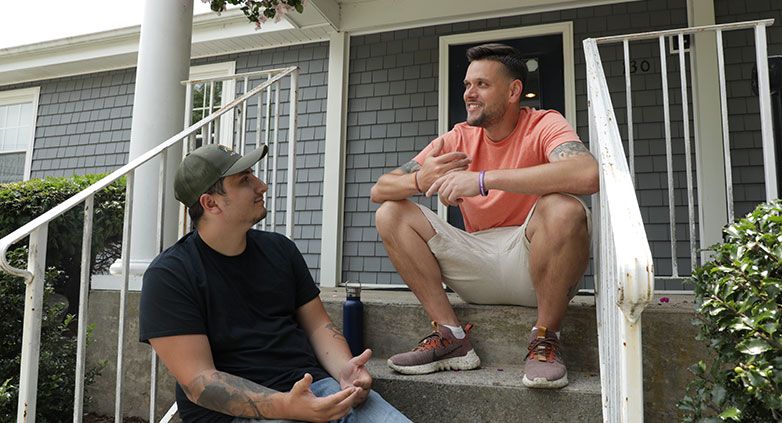Addiction is a Family Disease – 10 Ways SUD Affects Families
Substance use disorders (SUD) are not an isolated incident that only impacts the addict; addiction is a family disease, meaning that the ravages of drug and alcohol abuse touch everyone.
Why is Addiction a Family Disease?
Addiction begins and ends with familial systems. When a household is dysfunctional, a child can experience loneliness and depression, which can drive them to seek dopamine from drugs or alcohol. When a member of a household is abusing substances, their actions affect everyone around them. It can drive parents and siblings to engage in deception, enabling arguments, isolation, and financial overexertion. These habits can perpetuate addictive behavior and begin an unhealthy cycle that leads the next generation toward substance abuse.
However, there is hope. The best treatment is one that embraces everyone in the community because addiction is a family disease. Only then can healing begin and sobriety become lasting..
10 Signs That Substance Abuse Affects the Entire Family
When someone has a substance use disorder, it doesn’t just affect them but their entire social network. Listed below are signs of how addiction affects the community surrounding the person with SUD. If you recognize any of these signs in your family, contact Project Courage for more information about compassionate substance abuse recovery.
1. Increased conflict and arguments
2. Financial strain due to substance-related expenses
3. Isolation from relatives and friends
4. Shifts in family roles to accommodate the addict
5. Emotional distress among friends and family members
6. Neglect of family responsibilities
7. Secrecy and lies becoming commonplace
8. Deterioration of trust between siblings, parents, and children
9. Changes in children’s behavior or performance at school
10. Increased health problems among family members

1. Increased conflict and arguments
Substance abuse disorders cause strife as family members feel forced to take sides. If an adult child is the one with the disorder, parents may find themselves placing blame, enabling the child, or hiding things from their spouse. When a parent or sibling has the disorder, it is normal for relatives to disagree on the best course of action.
2. Financial strain due to substance-related expenses
When a loved one is abusing substances, there are a lot of expenses that take a toll on the people around them. These can range from moderate expenses, like the occasional loan, to extreme expenses, like raising the addicted person’s child. Other contributors to financial strain include:
- If the person is stealing money to fund their habit
- The cost of sending the loved one to programs to get them sober
- Family members may need to take time off work to care for, support, or search for their loved one
- If the person with a SUD can’t maintain employment, parents or siblings may shoulder the cost of feeding and housing them
- The cost of substance-related medical care
Financial strain can lead to greater stress, arguments, lying and keeping secrets, distrust, and risk of health problems.
3. Isolation from relatives and friends
While addiction is a family disease, it most severely affects their siblings, parents, and children, rather than distant relatives. As a result, those relatives may not see or understand the scope of the problem. This could lead to tension if distant aunts, uncles, and cousins give unsolicited advice, place blame, or make insensitive comments about the situation. The immediate relatives may feel like no one understands their struggle and push away their friends, aunts, uncles, cousins, and grandparents.
4. Shifts in family roles to accommodate the addict
While every situation and household is different, there are common family roles in addiction that people often find themselves falling into. These roles are a reaction to the addict, either to enable them, dismiss them, or protect themselves. Filling these roles often leads to dishonesty and lack of trust as parents and siblings attempt to navigate the bombshell that is substance use.
These roles are often invisible to the people inside those roles. It usually takes an outside perspective to help untangle the thoughts, feelings, and habits that had evolved in response to a loved one’s substance use. If you or a loved one struggles with drugs or alcohol, give Project Courage a call for a confidential consultation.
5. Emotional distress among friends and family members
The emotional toll that addiction takes on parents, siblings, and children is well-documented. It is extremely distressing to watch your loved one go through the throws of substance abuse. You may feel powerless to help as they went through:
- Withdrawal symptoms
- Struggled to stay sober
- Relapsing
- Lost their job or housing
- Lied to you
- Stole from you to buy drugs or alcohol
- Experienced health problems
- Threw their life away over drugs or alcohol
- Lashed out at you for trying to help
Every situation is different when it comes to substance use, but addiction often transforms loved ones into someone their family doesn’t recognize. It hurts to see your parents, siblings, or children suffer, especially when you don’t know how to get through to them to convince them to get and stay sober.

6. Neglect of family responsibilities
When someone you love has a substance use disorder, it is normal for everyone around them to react to that person. This is the key reason why addiction is a family disease. A parent may become an enabler by refusing to maintain boundaries with the addict. This person often becomes the addict’s lifeline, meaning that all their energy goes towards them, and they have no energy left to maintain their other familial relationships. When a parent neglects their other children by focusing on the child with the SUD, the parent-child relationship erodes. This can cause the addict’s siblings to be angry with them, distant from other relatives, and not close to each other.
When familial relationships are neglected, people drift apart. If a relationship becomes estranged, repairing the rift and returning to a loving place can be very difficult.
7. Secrecy and lies becoming commonplace
Substance use disorders come with a lot of stigma, which can manifest as shame for the addict and their relatives or difficulty asking for support. Because of this stigma, a family can fall into a pattern of secrecy and lies. People with a SUD may lie to their loved ones to cover up their substance abuse. Their parents or siblings may lie to each other to enable the addict, to keep the peace, or to hide their distress. A household may also lie to distant relatives to maintain the illusion that everything is okay.
8. Deterioration of trust between siblings, parents, and children
The first sign that addiction is a family disease is the deterioration of trust. This can occur in 3 different ways:
Loss of trust in the person who abuses drugs or alcohol
Since drugs and alcohol distort the functionality of the brain, addiction can cause people to act impulsively, create memory loss, contribute to paranoia, and cause depression. When someone’s brain has been hijacked by substances, they will likely lie, use their loved ones, and blow up at the people around them. These behaviors cause their friends and family to no longer trust them or believe what they have to say.
Diminishing trust between household members
When a loved one struggles with addiction, it affects not just them but their parents, siblings, and children. People often take on specific roles in response to the situation, usually by enabling it, distracting from it, taking the blame for it, or disappearing from family life. These roles may require people to be disingenuous with the people around them, causing lies and secrecy to build up. The rest is that the trust between siblings, parents, and children is damaged.
A child’s loses their ability to trust
When children of any age have a parent who abuses drugs or alcohol, that environment can impair their ability to form connections with other people. Teens with addicted parents may become hyper-independent so that they don’t need anyone, thus pushing away anyone who could support them. When these children grow into adults, they may have difficulty forming trusting relationships and friendships because they never saw that trust modeled for them at home.
9. Changes in children’s behavior or performance at school
When a parent or sibling struggles with addiction, it has an adverse impact on a child’s physical health, mental wellbeing, and their academic performance. Barriers to a child’s success often look like:
- Kids coming to school with no school supplies because the money was spent on drugs or alcohol
- Young children may mimic the dysfunctional behavior in their home, which causes them to get in trouble at school and be alienated from their peers
- Living in a household with an addict is very stressful, so children in that situation may perpetually be in fight or flight mode, making them unable to relax and learn
- Depending on the severity of the situation, a child’s basic needs may not be getting met
- A parent may be unable to academically support their child by helping them with homework, advocating for them academically, and going to parent-teacher conferences
10. Increased health problems among family members
It is well-documented how stress can contribute to health problems like obesity, insomnia, heart disease, elevated risk of cancer, and immune system problems. Dealing with a loved one who abuses substances creates chronic stress for everyone around them, which affects their health.
Substance abuse doesn’t only impact the person struggling with the disorder. Because addiction is a family disease, it impacts everyone the addict knows and loves. This is why Project Courage specializes in community-centered recovery and healing. Contact us today for more information about programs and intake options.

What Are the 7 Family Roles in Addiction?
As mentioned above, there are certain roles that members of a household often fall into when faced with substance abuse.
1. The Addict
Whether they are a parent, child, or sibling, they are the source of conflict because their disease drives them to lie, steal, cheat, use, insult, and disappear from their loved ones.
2. The Caretaker
This person is often the parent of the addicted person, most commonly their mother or grandmother. Caretakers put all their energy into maintaining a peaceful home at the expense of their health and well-being.
3. The Hero
Most of the time, the hero is the eldest child. The hero will try to appear perfect in all areas and attain high levels of success that they believe will make their home life okay. This eventually causes burnout and resentment.
4. The Scapegoat
This is the person who gets blamed for the problems that are caused by addiction. The scapegoat is often the overlooked child; they can be the middle or the youngest child. The constant blame will lead them to withdraw from their parents and siblings.
5. The Mascot
Out of a set of siblings, the youngest child, who was doted on by the parents over their older siblings, is more likely to become the mascot. They will use humor to keep everyone happy so that no one gets upset or argues.
6. The Lost Child
This person is overlooked and withdrawn from the rest of the family. They are uninvolved in the household dynamic and receive very little attention. While the lost child can be anyone in a set of siblings, this role is most commonly embodied by step and half-siblings, oldest children with a large age gap between them and their siblings, and middle children.
7. The Enabler
While they mean well, their inability to create boundaries with the addict will drive everyone into greater dysfunction. Enablers will support the addicted person, lie for them, and make excuses. In a household, enablers are often older than the addict, like a mother, father, older sibling, or grandparent.

The Importance of Family-Based Addiction Treatment
Since addiction is a family disease, the entire household must be treated for recovery to be successful. The addict’s actions do not happen in a vacuum; dysfunction in the home can create the seeds of addictive tendencies, perpetuate the behavior, and be worsened by the roles parents and siblings fall into. It is very hard for a person with a substance use disorder to get sober when they are in the same environment that led to their disorder in the first place. For recovery to be successful, the dysfunctional behaviors and cycles must be ended so that healing can begin.
Compassionate Substance Abuse Recovery in Connecticut
Project Courage is a facility at the forefront of treating addiction as a family disease. We offer services not only for the person with the disorder but for everyone who loves them. If you or a loved one is struggling with substance abuse, call today to verify your insurance.



Leave a Reply
Want to join the discussion?Feel free to contribute!